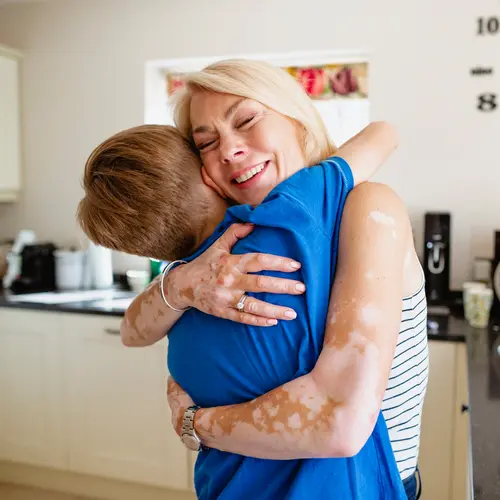What Is a Cold Sore?
A cold sore is a group of tiny, painful blisters caused by the herpes simplex virus (HSV). They’re also called fever blisters or herpes simplex labialis.
Up to 90% of people around the world have at least one form of HSV.
The symptoms are usually the most serious the first you time you get cold sores. A first-time cold sore can make a child seriously ill.
After the first outbreak, your body should make antibodies, and you may never have another infection. But many people get cold sores that come back.
Cold Sore Symptoms
Cold sores are most likely to show up on the outside of your mouth and lips, but you can also get them on your nose and cheeks.
You may get cold sores as late as 20 days after you’re infected. The sore might appear near where the virus entered your body.
Cold sores happen in stages:
- You have a tingling, burning, or itching feeling.
- About 12-24 hours later, blisters form. The area becomes red, swollen, and painful.
- The blisters break open and fluid comes out. This usually lasts 2 or 3 days.
- A scab forms on the sore. It might crack or bleed.
- The scab falls off.
You might also have red or swollen gums, swollen glands in your neck, fever, or muscle aches.
First-time infections can also cause:
- Burning and pain inside your mouth
- Sore throat
- Pain when you swallow
- Headache
- Upset stomach
Cold Sore Causes
You catch HSV when you come into contact with people or things that carry the virus. For instance, you can get it from kissing someone who has the virus or from sharing eating utensils, towels, or razors.
Two types of the virus can cause cold sores: HSV-1 and HSV-2. Both types can also cause sores on your genitals and can be spread by oral sex.
Type 1 usually causes cold sores, and type 2 mostly causes genital herpes, but either can be found in both areas.
Certain things can trigger an outbreak, including:
- Some foods
- Stress
- Fever
- Colds
- Allergies
- Fatigue
- Sunburn or being in strong sunlight
- Dental work or cosmetic surgery
- Your period
Cold Sore Risk Factors
Cold sores generally aren’t serious, but the infection may be life-threatening for someone who has a weakened immune system because of AIDS, another condition, or medications.
If you have a serious case of the skin condition eczema, you may get cold sores over large parts of your body.
Cold Sore Diagnosis
Your doctor might diagnose a cold sore just by looking at the blisters. They can also swab the blister and test the fluid for HSV.
Cold Sore Treatment
There’s no cure for cold sores. Once you have the virus, it stays in your body. The sores themselves usually heal on their own in 1 or 2 weeks.
Antiviral medications can speed healing, especially if you take them at the first sign of an outbreak. Your doctor might tell you to use:
- Cream that you apply on the sores. Acyclovir (Zovirax) and penciclovir (Denavir) require a prescription, or you can get docosanol (Abreva) over the counter.
- Pills you swallow, like acyclovir (Sitavig, Zovirax), famciclovir (Famvir), or valacyclovir (Valtrex). You need a prescription to get these.
- Medicine injected into your bloodstream (called intravenous or IV), such as cidofovir (Vistide) or foscarnet (Foscavir), if you have a serious case. Acyclovir can also be injected.
Some home remedies can help you feel better while you heal:
- Cold, damp compresses
- Over-the-counter pain medicines like acetaminophen and ibuprofen
- Cream painkillers with benzocaine or lidocaine
- Treatments with alcohol to dry out the blisters
- Lip balms and creams to keep moisture in
Cold Sore Complications
Complications from a cold sore are rare, but can happen if the virus spreads to another part of your body, including your:
- Fingers. This infection is called herpes whitlow.
- Genitals. You might have warts or ulcers on your genitals or anus.
- Other areas of skin. If you have eczema and get a cold sore, see your doctor right away to avoid a serious condition called eczema herpeticum. This painful rash covers large areas of skin.
- Eyes. HSV keratitis, an infection in your cornea, can cause blindness.
- Brain or spinal cord. The virus can cause dangerous inflammation called meningitis or encephalitis, especially in people who have weakened immune systems.
Cold Sore Prevention
To lower your risk of another outbreak:
- Get plenty of rest. A lack of sleep weakens your immune system, so you get sick more easily.
- Wear lip balm with sunscreen. Look for SPF on the label.
- Talk with your doctor. If you get sores often, they might have you take an antiviral medicine every day.
To keep from spreading the virus, when you have cold sores, don't:
- Kiss anyone
- Share eating utensils, glasses, towels, lipstick or lip balm, or razors
- Have oral sex
Keep in mind that you can spread the virus even if you don't have symptoms.

